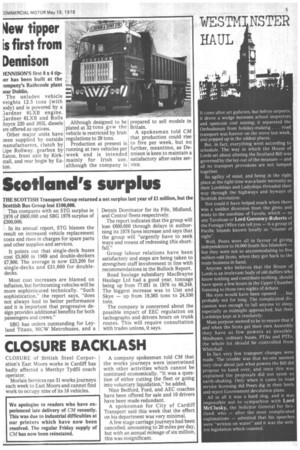WESTM NSTER
Page 7

If you've noticed an error in this article please click here to report it so we can fix it.
HAUL II
it came after art alleries, but before airports; it drove a wedge between school inspectors and opencast coal mining; it separated the Ombudsman from holiday-making . . . road transport was forever on the move last week.
and popped up in the oddest places.
But, in fact, everything went according to schedule. The way in which the House of Lords set about altering the Scotland Bill was governed by the lay-out of the measure — and all its transport provisions are not lumped together.
So agility of mind, and being in the right place at the right time was a basic necessity as their Lordships and Ladyships threaded their way through the highways and byways of Scottish devolution.
Nor could it have helped much when there was a sudden diversion from the glens and mists to the sunshine of Tuvalu, which — as any Tuvaluan or Lord Goronwy-Roberts of
the Foreign Office can tell you — is a group of Pacific Islands known locally as "cluster of eight".
Well, Peers were all in favour of giving independence to 10,000 South Sea Islanders — but they were not so accommodating to five million-odd Scots, when they got back to the main business in hand.
Anyone who believes that the House of Lords is an irrelevant body of old duffers who know nothing and contribute nothing, should have spent a few hours in the Upper Chamber listening to those two nights of debate.
His eyes would have been opened . . . but probably not for long. The complicated discussion was enough to lull anyone to sleep, especially as midnight approached, but their Lordships kept at it resolutely.
I I I ose seemed to be to ensure that if
and when the Scots get their own Assembly they have as few powers as possible. Minibuses, ordinary buses, PTAs and PTEs, the whole lot should be controlled from Whitehall.
In fact very few transport changes were made. The trouble was that no-one seemed very clear about just what powers the Bill did propose to hand over, and once this was explained the proposals did not seem so earth-shaking. Only when it came to road service licensing did Peers dig in their heels and reject Government devolution plans.
All in all it was a hard slog, and it was impossible not to sympathise with Lord McClusky, the Solicitor General for Scotland. who — after the most complicated explanations — admitted that his speeches were "written on water" and it was the written legislation which counted.












































































































